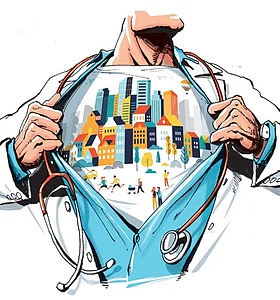The Debate Over Integrative Healthcare in Tamil Nadu
Tamil Nadu’s healthcare landscape is currently under scrutiny as the state government’s decision to promote integrative healthcare has sparked a heated debate among medical professionals. The Directorate of Public Health and Preventive Medicine (DPH) recently signed a Memorandum of Understanding (MoU) with the Commissionerate of Indian Medicine and Homeopathy and the National Institute of Siddha. This collaboration aims to integrate traditional systems of medicine, such as Siddha, into the public health framework. However, the move has been met with strong opposition from the local medical community.
Government’s Perspective on Integrative Healthcare
According to Dr TS Selvavinayagam, the director of Public Health and Preventive Medicine, the initiative seeks to offer affordable and culturally relevant healthcare options to the people of Tamil Nadu. He emphasized that integrating validated Siddha practices into the public health system would bridge the gap between modern medicine and India’s rich heritage of traditional healing. The partnership, he added, aligns with the government’s vision of promoting holistic, inclusive, and accessible healthcare for all citizens.
The DPH claims that this step reflects a broader national goal of achieving a unified health system by 2030. The initiative is part of a larger push by the central government to establish a ‘One Nation-One Health system,’ which integrates various systems of medicine into a cohesive framework.
Concerns Raised by Medical Associations
Despite the government’s stance, several medical associations have voiced their concerns. Dr GR Ravindranath, general secretary of the Doctors’ Association for Social Equality (DASE), criticized the DPH’s efforts, calling them condemnable. He argued that the move could undermine the quality of medical treatment available to the public. According to him, the central government is pushing for an integrated medical system through multiple institutions, including the National Medical Commission, NITI Aayog, and the National Health Policy 2017.
Dr Ravindranath highlighted that the central government is attempting to introduce a new integrated medical course at JIPMER, Puducherry, combining the MBBS program with the BAMS (Bachelor of Ayurvedic Medicine and Surgery) course. He warned that such an approach could dilute the standards of both modern and traditional medicine.
Criticism of the Term ‘Mixopathy’
Dr A Ramalingam, secretary of the Service Doctors and Post Graduates Association, described the initiative as “Mixopathy.” He argued that merging different systems of medicine could lead to a gradual decline in the standards of all medical disciplines. According to him, the state health department is making a historic mistake by taking a step that could have long-term consequences on the quality of healthcare delivery.
The medical community is divided on the issue, with some advocating for the inclusion of traditional practices as complementary to modern medicine, while others fear that such integration may compromise the integrity of established medical systems.
The Road Ahead
As the debate continues, it remains to be seen how the integration of traditional and modern medicine will shape the future of healthcare in Tamil Nadu. While the government emphasizes affordability and cultural relevance, critics argue that the move may not be in the best interest of patients. The challenge lies in finding a balance between innovation and maintaining high standards of medical care.







